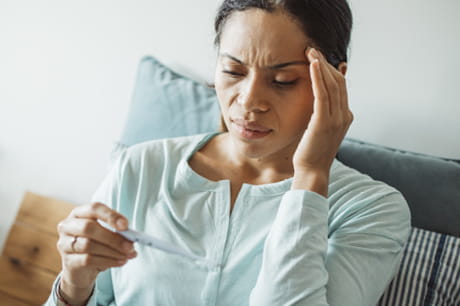What to know about salmonella
Protect yourself against this common foodborne illness, which can have serious symptoms.
What do prepackaged salads, peanut butter and dog food have in common? They’ve all been recalled recently due to possible salmonella contamination. This type of food poisoning pops up in places you might not expect, so be on the lookout for this sneaky bacteria.
What is salmonella?
Salmonella is a type of bacteria that lives in the GI tract of animals and people. When it makes its way into your mouth and stomach, an infection called salmonellosis can cause you to feel pretty sick.
“Most infections are a result of contaminated food or water that isn’t properly sanitized,” says Greg Burke, MD, an internal medicine doctor at Geisinger.
Besides bad water, you can get a salmonella infection in a few ways:
- Eating undercooked meat or eggs or unpasteurized dairy products
- Handling certain animals, like turtles or ducks
- Improper handwashing
A salmonella infection can be mild. Or it can be serious enough to cause hospitalization.
Symptoms of salmonella
Symptoms usually appear within 12 to 36 hours. But they could start as soon as six hours or as late as 72 hours after contact.
If you have salmonellosis, you may have some or all of these:
- Fever
- Nausea
- Abdominal pain
- Diarrhea
- Vomiting
- Bloody stools
- Chills
- Headache
Symptoms usually last between two and seven days. Contact your provider if your symptoms last longer than a week.
Treating salmonella
Stomach symptoms have you suspecting a salmonella infection? Drink plenty of fluids and rest.
“This infection might keep you in the bathroom for a few days, so it’s important to stay hydrated,” said Dr. Burke.
If you have trouble keeping fluids down, your provider may recommend sipping sports drinks or broth to boost electrolytes and avoid dehydration.
The infection usually clears on its own in about a week. But certain symptoms like diarrhea may linger a little longer.
“It may take several weeks for your bowel movements to return to normal,” Dr. Burke says.
An ounce of prevention
Salmonella prevention starts with you. Several tips can keep you (and others) healthy.
Take precautions in the kitchen:
- Keep a clean environment while cooking.
- Wash fruits and vegetables before eating.
- Cook meat and eggs fully, using a thermometer to check meat temperature.
- Store food properly, refrigerating any leftovers.
- Steer clear of unpasteurized or “raw” dairy products.
- Prevent cross-contamination. “To reduce risk of illness, use different utensils for cooked and uncooked foods,” Dr. Burke says.
- Clean your hands before and after cooking.
- Throw out anything that’s been recalled for potential contamination.
Handle animals with care:
- Keep hands away from your mouth and eyes when handling animals.
- Wash your hands or use hand sanitizer after any contact with farm animals, household pets or animal droppings.
- Don’t eat around animals.
Swim wisely:
- Don’t swallow water when swimming.
- Stay out of the water if you have diarrhea.
- If you have a pool at home, be sure to test your chlorine and pH levels.
You may not completely avoid salmonella. But by practicing good habits, you can reduce your risk of salmonellosis — and that can help you live your healthiest life.
Next steps:
Get care now
Diarrhea? When to call your doctor
Meet Greg Burke, MD

